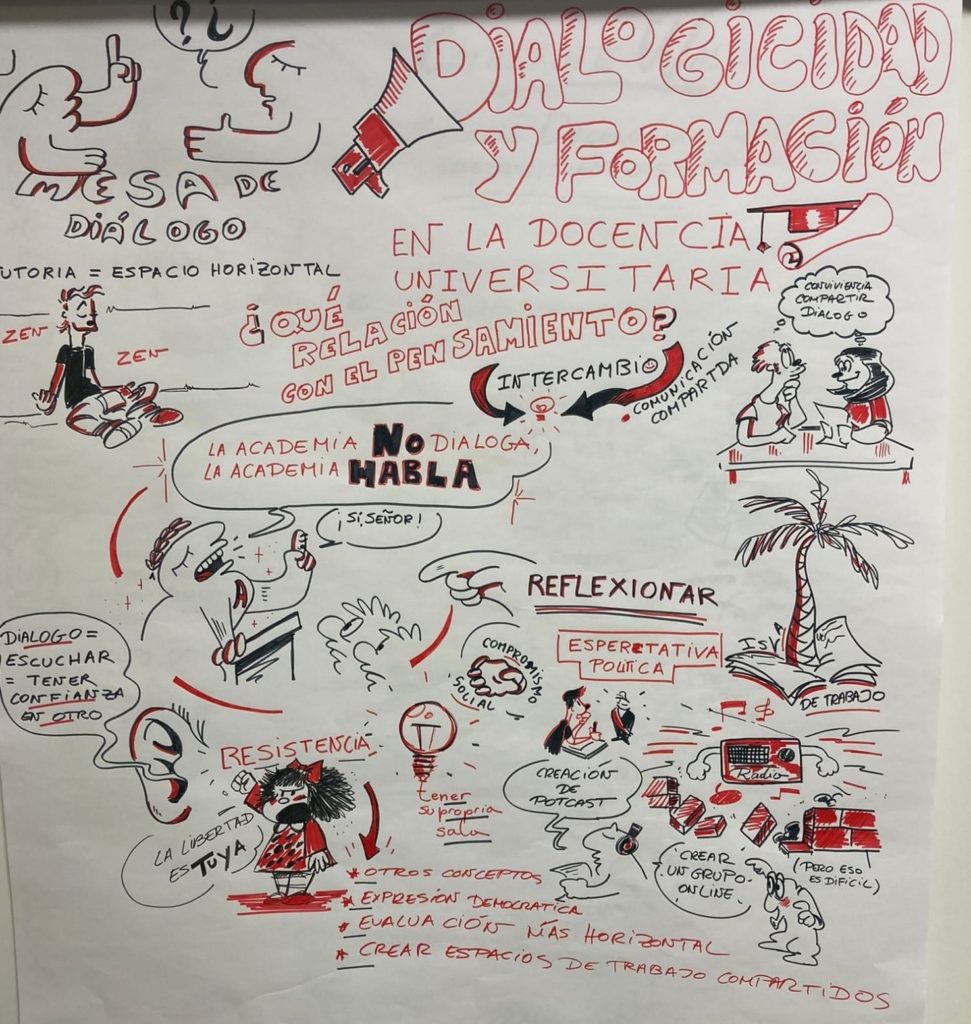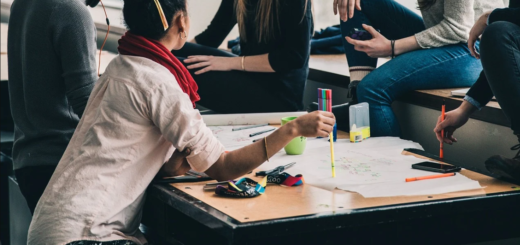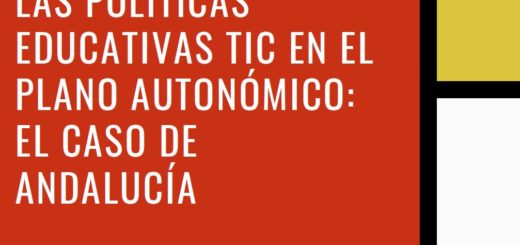Collaborative networks for social transformation. Expanding dialogue in teacher education
In the context of the pandemic and what it meant for our new approach to teaching, we continued to generate intense debate in the online meetings. We were getting closer and closer to the meaning of engagement with transformation inside and outside the university classroom. As Miller (2003) argues, linking the university classroom with transformative projects allows us to establish solid foundations from two distinct cultures, the academic and the popular. This allows us to go beyond the boundaries of the university institution to respond, together with other professionals, to the needs of the most vulnerable population. It also makes possible to move forward in decision-making and participation in common projects. At the same time, it allows to build new areas of development for university teachers in relation to professionals in the social and educational spheres related to their field of knowledge. For us, university learning in collaboration with democratic social and educational projects constitutes a rich field for education, analysis, and critical thinking, forming part of the construction and care of the commons and inclusion.
In expanded learning processes, i.e., those that take place outside the classroom and are experience-centred, we were concerned about how to bring conceptual frameworks into the dialogue. We were interested in linking existing critical theories according to the disciplines and subjects involved, with personal and collective narratives.
Also relevantly, a very fruitful internal debate took place on how to analyse students’ productions, our discourses, relationships, and teaching practices from a feminist perspective.

Paulo Freire’s legacy has been an inspiration in the dialogue. It was an important reference in relation to build a sense of collaboration of the seventeen participating teachers, which has been built around the innovation project in the university classroom. The starting point of this collaboration was to share our experiences, our insecurities, our desires, and limitations when working in the academic subjects with the real inclusion needs of children, families, and teachers in formal and informal education. We see collaboration in our classrooms as a way of contributing to a new language of community, engaging in a joint and diverse dialogue that builds a new narrative of our experience of learning, of education and of the world. In the words of Bell Hooks (2022) “pedagogy of engagement presupposes that all learners can make valuable contributions during the learning process” (p. 34).
This dialogue was gradually filled with the desire to share outside the group the concerns that occupied us and the themes that emerged in the analysis of our collaborative practices. This is how the 1st International Congress on Experience, Knowledge, and Social Commitment. Networks of Transformation came into being, was conceived. Once this idea was turned into a real project, two issues worried us: to put into dialogue, in the broadest possible way, the themes that had emerged from the innovation project; and that this could be done in a dialogic and collaborative process, in horizontal spaces.
The interest focuses in which the congress is organised are designed to invite dialogue. They are proposed with the intention of constructing a new language, bringing into play different expressive and communicative formats about community education. Through this language, collaborative strategies are sought to involve all of us through forms of mutual association based on differences that allow us to build critical and committed educational processes in the university as a way of rethinking ourselves.
Each of the congress activities arises from the proposals of the participants in the educational innovation project. Essentially, diversity was sought in any of the actions, which should guide the sense of the contributions presented, in order to make sense of them collectively and generate a space for shared dialogue.
The questions to think in order to advance educational transformation in teacher training were organised into five issues. Below, we share the micro-texts produced by those responsible for each axis of dialogue. In this way, we intend to show the dynamics of the work and the way in which the participants shared their contributions. We believe it is important to stress that each group responsible had the autonomy to elaborate their proposal in accordance with the sense that had been built throughout the innovation project.
- Linkages and engagement in social and educational transformation
Why and for what purpose do we educate? What are the meanings of doing so? These are some of the questions that move those of us who deal with education. Undoubtedly, educating refers to the bond that is generated in the encounter between people in which each participant is modified. However, educating only makes sense insofar as it contributes to the collective transformation of the societies in which we live. The collective sense is the north that guides us. This sense has been undermined in the international contexts of neo-liberal policies, which have placed individual development, based on personal effort, above community and social interest. Discussing it, recovering it, projecting it, and dreaming it in these spaces will help us to find shared points of support in pursuit of the construction of fairer and more united societies.
- Disruptive biographies, performances, and meta-stories in learning
Horizontality and transversality in the processes of knowledge construction: Faced with the paradigm of the expert and the hegemonic forms of knowledge construction, we propose a communicative space to provoke unlearning and understand knowledge as a common; learning experientially and relationally. We ask ourselves: who holds the power in the construction of knowledge and to whom do we give legitimacy and authenticity? How do we deconstruct power relations? How do we enable the ecology of knowledge, respecting singularity and promoting transversality? How do we change the world from the individual and/or collective and shared stories, how do we link saying and doing?
Expression, creativity and disruptive narratives: Faced with the imposition of the written text, the weight of argumentation and the hegemonic formats for the construction and transmission of knowledge, we ask ourselves: how can we practice education as a space for the creation of freedoms? How do other forms of expression allow us to narrate ourselves? What formulas and possibilities of expression, understanding and creation of knowledge define us? How can disruptive stories and formats change our visions and relationships?
Transitions from academicist logic: A transversal axis in which we encourage you to delve deeper and ask yourselves, from an emancipatory point of view, about other possibilities of understanding and reinventing the university.
- Feminism and teacher education
Talking about teachers and teacher education also implies talking about the profession of the teacher, about what it is doing-feeling and thinking. Teachers are expected to fulfil and respond to multiple tasks, but there is one that, in our opinion, they cannot do without: this is to “teach how to read” and read the world and thus help to think and build critical thinking. To this end, we consider it fundamental that this reading of the world and this sensitivity to do so should be done through feminist lenses, from perspectives that are crossed by gender and sexualities.
We cannot fail to recognise that the work of teachers is, in the best of cases, a bridge to problematise this world and that, in neoliberal times, it is valuable to have perspectives that question the logic of “every man for himself”. Gender issues are not exempt from the perversity and violence with which this system expels multiple collectives and dissidences.
From this point of view, educating becomes more than just transferring knowledge; it implies creating the possibility of constructing diverse knowledge and enabling the untimely listening of the other. For this to happen, it is essential to review oneself, to think about oneself, and to accommodate the possibility of understanding that the educator is a subject traversed by sexuality. It is to understand that students are also subjects who inhabit a body, to question the idea that mind and body are watertight compartments and that the relationship with knowledge and knowledge are neutral. To make education emancipatory and to build fairer places to live in, it is essential to create spaces that allow us to reflect on the imaginaries that have historically traversed us, on the ways of conceiving and living sexuality, that allow us to deconstruct ideas of supposed neutrality and to produce other ways of doing pedagogy and inhabiting the school.
- Critical Thinking and Action
Critical thinking refers to the active process of conceptualising, analysing, synthesising, recreating and/or evaluating a reality to generate new or alternative possibilities for another world and thus another, better education, and dignified citizenship. Critical thinking, through observation, experience, reflection, or reasoning as a guide to reconstruct belief and action, involves the examination of the structures or elements of thought – purposes, assumptions, concepts, implications, worldviews, frames of reference, etc. – imposed and disseminated by norms and norms and practices. – imposed and disseminated by social norms and systems that shape very deep aspects of our identities – such as gender, ethnicity, nationality, class, professional ethos, etc. Critical action, therefore, involves collective work to dismantle oppressive social and ideological systems. On these two inseparable axes – critical thinking and critical action – the educator Paulo Freire has anchored the transformative praxis of his critical pedagogy. We invite debate on theoretical, philosophical, or empirical reflection on critical thinking and/or critical action.
- Dialogicity and training in university teaching
In the face of an educational discourse colonised by the logic of the market, where concepts such as quality, excellence or innovation overshadow education, it is necessary to value those proposals which, without being innovative, involve radical approaches and, in these revolutionary times, we want to open a space in which we can share proposals and practices in teacher training that recover the democratic sense of education, from dialogical perspectives that allow us not only to understand the world, but also to take an active part in the co-construction of knowledge. From this perspective, we propose this dialogue as an opportunity to discuss possible alternatives, contrary to hegemonic training in university teaching, based on dialogue, mutual recognition, and the commitment necessary for the transformation and promotion of emancipatory educational practices at the University.
References
Hooks, B. (2022). Enseñar pensamiento crítico. Rayo Verde.
Miller, L. (2003). El consorcio entre la escuela y la universidad como lugar de encuentro para el desarrollo profesional. In A. Lieberman & L. Miller (Eds). La indagación como base de la formación del profesorado y la mejora de la educación. Octaedro. (pp.129-146)

Authors:
Virginia Martagón Vázquez
José Luis del Rio Fernández
Piedad Calvo León
María Jesús Márquez García
Grupo de Investigación ProCIE: Profesorado, Comunicación e Investigación Educativa
Universidad de Málaga y Almería






